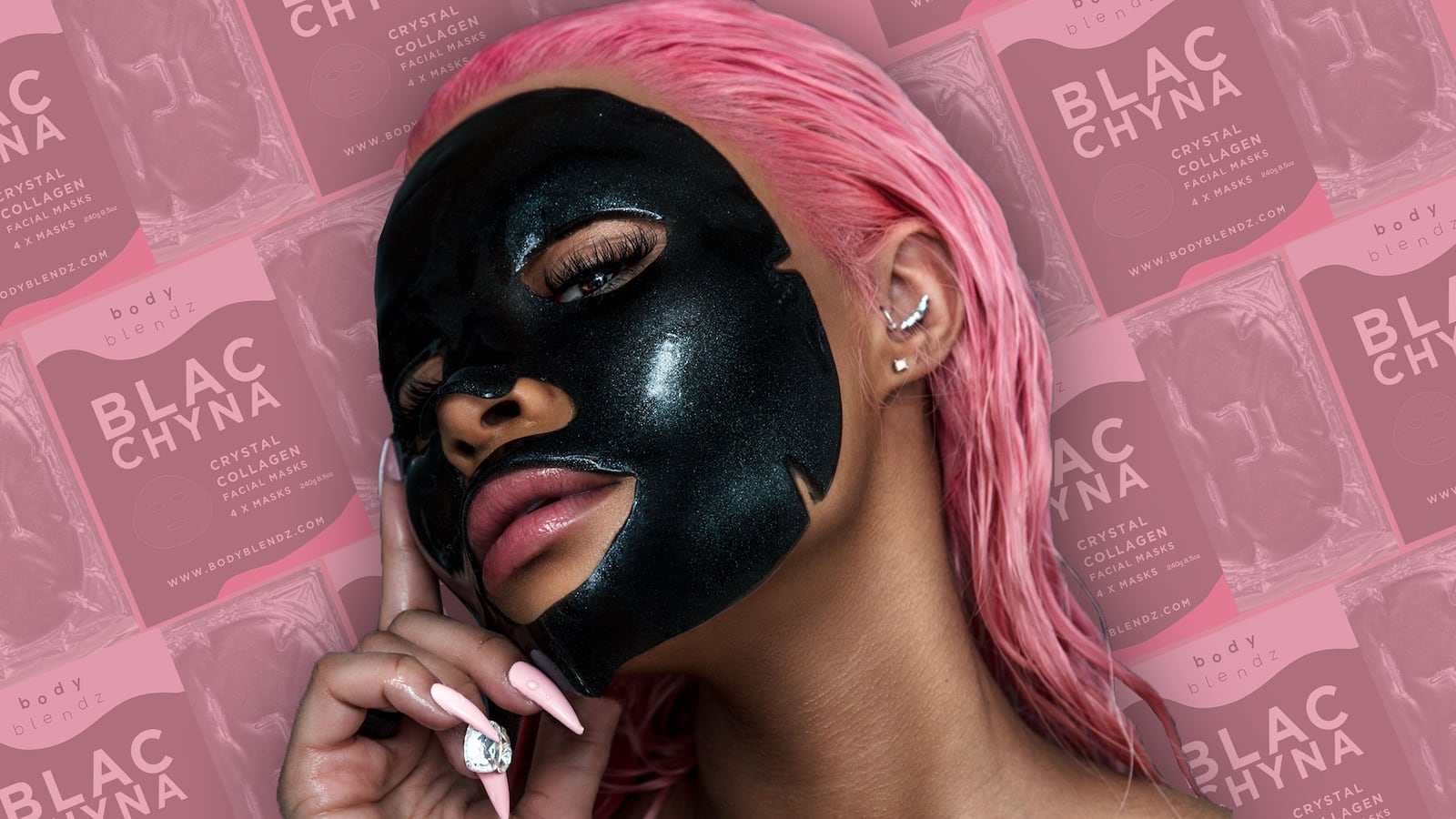Welcome to Debunker, a weekly breakdown of misleading (and sometimes flat-out wrong!) news from the worlds of science, health, and more—for Beast Inside members only.
In an Instagram post last week, model and entrepreneur Blac Chyna is seen pouting with a jet-black mask on her face. “Say hello to your new must-have for seriously smooth, glowing skin,” Chyna wrote, in a post that received more than 25,000 likes.
“The Blac Chyna X Blendz Crystal Collagen Facial Mask, an intensely hydrating, purifying treatment mask is your ticket to a radiant, even-toned and clarified complexion.” In another post, she called collagen face masks “one of the hottest skin care products nowadays.”
Chyna is right—when it comes to skin, collagen is vital. It’s one of the most important proteins in the body, serving as a crucial building block for bones, muscles, and skin. Along with the protein elastin, it helps maintain the structure of the skin, providing a firm, youthful-looking complexion. But we produce less of it as we age—about 1 percent less every year after we turn 20, one dermatologist said—leading to the fine lines and wrinkles that many people dread.
In recent years, skincare brands have pushed a solution to sagging skin: We can put that collagen back with face masks. Chyna’s mask (four face masks for $23.99) claims that the collagen infused within the mask “will help reduce signs of aging, clearing away the appearance of fine lines and wrinkles, as well as filling in scars caused by acne.”
“This will result in long-lasting, youthful skin,” the site says.
But dermatologists disagree. Extra, surface-level collagen in face masks won’t necessarily harm you, but there’s no evidence that it’ll reduce wrinkles.
“It would be nice if it were that easy,” Shari Lipner, a dermatologist at Weill Cornell Medicine and New York Presbyterian, told The Daily Beast. “However, I think if you really think about how collagen is absorbed and how collagen is synthesized, you’ll see that that just can’t be true.”
That’s because the collagen molecule can’t penetrate through the outer layer of skin, Lipner said. The skin has three layers: the innermost layer of fat and connective tissue (the hypodermis), the middle layer where naturally produced collagen resides (the dermis), and the protective outer layer (the epidermis). Collagen will stop at the epidermis when applied via face mask, preventing it from reaching the dermal layer.
Rita Khodosh, an assistant clinical professor of dermatology at the University of California, San Francisco, agrees.
“Collagen in a mask or a moisturizer has no way of actually penetrating through the skin into the dermis,” Khodosh told The Daily Beast. She explained that, at best, the mask could moisturize the skin—but the collagen molecule can’t get deep enough to meet up with the stores in the dermal layer.
“It’s just a big molecule,” Khodosh added. “And only very small molecules can penetrate the skin.”
Blac Chyna and Body Blendz did not respond to repeated requests for comment.
Some skincare companies acknowledge that the collagen molecule is too big to penetrate the epidermis on its own. They instead offer “hydrolyzed collagen,” a broken-down version of the collagen molecule that is apparently small enough to pass through the epidermis.
But Eva Hurst, an associate professor of dermatology and the Director of the Center for Dermatologic and Cosmetic Surgery at Washington University in St. Louis, is skeptical of even these, arguing that the molecules might never be hydrolyzed enough to sufficiently penetrate the dermis.
“Even if it’s hydrolyzed, it’s going to be too big to get through,” she told The Daily Beast.
There’s another problem. Even if the hydrolyzed collagen broke through the epidermis, Hurst said, “it wouldn’t just go and integrate with the rest of the tissues.”
Naturally occurring collagen in the skin, she explained, is woven together in a complex structure—and there’s no evidence to suggest that the topically applied collagen would be able to integrate itself into that structure.
“It would almost be like taking a house, tearing it down into a pile of bricks and mortar, and throwing it all together and expecting it to rebuild itself,” Hurst said.
There’s one final problem: Even if the collagen could be broken down enough to penetrate the epidermis, and even if it could reintegrate into existing collagen structures in the skin, there might not be enough new collagen in the dermis to cause any visible change.
“Collagen is something that for proper functioning we need in significant quantity. I don’t want to imply that it’s tons of it, but it’s more than a tiny amount,” Murad Alam, a professor and vice chair of dermatology at Northwestern University, told The Daily Beast.
Alam emphasized that we don’t yet know if there is a way that the collagen could effectively restore vitality in the skin—but there’s no evidence to suggest that it does.
“At this point, it seems like there are a lot of steps between applying it on the skin’s surface and it emerging as functional collagen in the dermis, a lot of intermediate steps that haven’t been explained,” he said, noting that there’s no evidence that collagen would have an impact on the epidermis, either.
Instead of relying on collagen, Lipner said, it’s best to focus on “what’s tried and true, and what’s been studied.” That includes minimizing sun exposure, applying SPF 30+ sunscreen, not smoking, and using retinoid creams.
All four dermatologists emphasized, however, that Chyna’s face masks and others like it probably won’t harm you, as long as you’re not allergic to any of the ingredients. And other parts of a collagen mask, like aloe vera, could certainly hydrate the skin and make it look younger.
“If a patient came to me and said that they were using collagen masks and they loved it,” Hurst said, “I would certainly tell them that I don’t see any harm in it and it can’t hurt to use these—but not to expect miracles.”
But Khodosh noted that there is one harm to think about. “You’re wasting your money,” she said. “Because most of the time these products are much more expensive than the generic moisturizer you could get at your corner drug store.”






